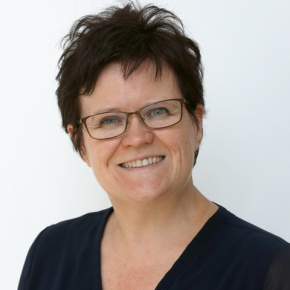CNRS Chemistry welcomes Cathleen Crudden as the Ambassador in Chemical Sciences
On November 12, 2025, Cathleen Crudden, Canada Research Chair in Organometallic Chemistry at Queen's University in Kingston, Ontario, Canada, will begin a series of lectures at several French CNRS laboratories as a CNRS Ambassador for Chemical Sciences in France1 . The work of Cathleen Crudden, who also heads a laboratory at the Institute of Transformative Bio-Molecules (ITbM) at Nagoya University in Japan, lies at the intersection of organic chemistry, materials science, and biology. It focuses primarily on asymmetric synthesis and catalysis, organometallic and organoboron chemistry, as well as materials chemistry and surface science.
- 1In 2019, CNRS Institute of Chemistry has initiated a program called “Ambassadors of Chemical Sciences in France”. Its ambition is to give prestigious foreign researchers an opportunity to visit a series of French laboratories active in their field. These visits not only include top-notch conferences by the ambassador, but are also a good opportunity to establish preliminary contacts and foster international collaborations for the visited French laboratories.
Trained in Toronto, Ottawa, and Urbana–Champaign (United States), Cathleen Crudden took charge of her first team at the University of New Brunswick. She then joined Queen’s University in 2002, where she founded the Carbon to Metal Coating Institute, a research center dedicated to studying the links between carbon and metal, which she still heads today.
Her first significant contributions concerned cross-coupling reactions, which are essential tools for the manufacture of many pharmaceutical molecules. She was the first to show that it is possible to carry out this type of reaction in an enantiospecific manner, i.e., by controlling chirality, a key property of biologically active molecules.
Her findings in a completely different field, that of organic coatings on metals, have also profoundly changed the game. For more than 35 years, there was no reliable technique for securely attaching organic molecules to metal surfaces, for example to protect them from rust. Cathleen Crudden showed that small carbon-based molecules, called N-heterocyclic carbene (NHC) molecules, could bind to metals to form exceptionally stable organic films that are resistant to oxidation, solvents, and extreme temperatures. These “organic skins” pave the way for more sensitive biosensors, anti-corrosion coatings for offshore wind energy, new materials for semiconductors, and even biomedical applications in cancer detection and treatment.
An internationally recognized scientist and elected member of the Royal Society of Canada, the Royal Society of Chemistry (UK), and the American Academy of Arts and Sciences, Cathleen Crudden has received numerous awards, including the John Polanyi Award (2023), the American Chemical Society's Cope Scholar Award (2019), and the Montreal Medal (2019). She is also editor-in-chief of ACS Catalysis, one of the most prestigious international publications in catalysis.
Editor : CCdM
Her conference: "Organometallic Chemistry in Catalysis and Material Science"
The use of N-heterocyclic carbenes to modify homogeneous metal catalysts is widespread since the high metal–NHC bond strength renders high oxidative and chemical stability to NHC–ligated metal complexes. Despite this fact, the use of NHCs to modify metal surfaces has received little attention until recently.
We will describe the use of NHC ligands to stabilize metal surfaces, including gold, copper, silver, platinum, ruthenium and cobalt. Self assembled monolayers prepared by the deposition of NHCs show molecular ordering on the surface and remarkable stability.
The impact of NHCs on the chemistry of nanoclusters will also be discussed, including the preparation of chiral NHC-stabilized Au nanoclusters. We will also describe advances in cross-coupling chemistry the preparation of complex chiral molecules of interest to the pharmaceutical industry.
This will include the ability to cross-couple seemingly identical boron substituents with different electrophiles, taking advantage of inherent differences in transmetallation behaviour and the development of sulfones as novel electrophiles for Suzuki-Miyaura cross coupling chemistry particularly in alkyl cross-coupling reactions. ...
Schedule of the conferences
- 12/11/2025 - Rennes - Institut des Sciences Chimiques de Rennes (contact : Jeanne Crassous)
- 13-14/11/2025 – Villeurbanne – Lyon - Institut de chimie et biochimie moléculaires et supramoléculaires (contacts : Anis Tlili et Abderrahmane Amgoune) et visite Laboratoire de Chimie ENS Lyon (contact : Laure Guy)
- 17/11/2025 - Paris – Institut recherche de chimie Paris (contact : Emmanuel Lacôte)
- 18/11/2025 - Gif-sur-Yvette – Institut de chimie des substances naturelles (contact : Tanguy Saget et Christophe Bour)
- 19/11/2025 - Nice – Institut de chimie de Nice (contact : Véronique Michelet)
